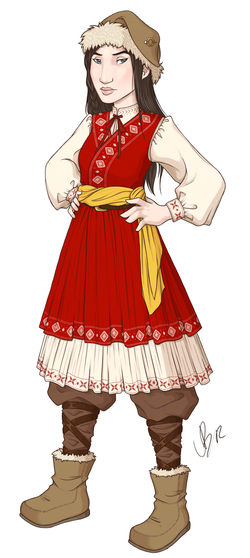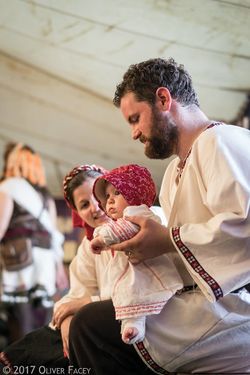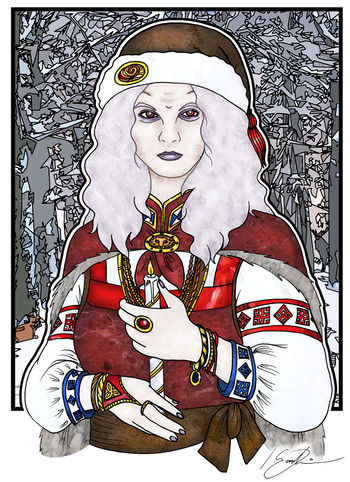Varushka culture and customs
Family
A respect for family is central to Varushkan culture. Varushkans commonly use familial titles to show respect and friendship. Friends may call each other cousin, or even brother, sister or sibling if they are particularly close. Calling someone aunt, uncle, or bibi indicates a significant degree of respect and acknowledges someone’s seniority and authority while grandparent, grandfather, or grandmother is usually used for the oldest and most respected members of the community. Individuals honoured in this way are usually treated just like any other family member.
Old age commands respect in Varushka. Older relatives who pass their wisdom and experience down to the younger generations are treasured. To the Varushkans, long years both grant and demonstrate wisdom. Fools die young, and their strength does not save them. Varushkan folklore includes countless stories where the young hero gets into trouble after ignoring the advice of their elders.
Often this tradition of the older generation passing their wisdom to the younger is demonstrated in the form of an apprenticeship. Rarely formalised, it is especially common with magicians and priests. An older individual takes a younger one "under their wing" and imparts their wisdom while engaging in day-to-day activities. The younger individual, for their part, helps the older in any number of ways, often serving as an assistant or conversational foil, for example.
Parting
Varushkans have a tradition of gift giving before and after a significant journey. When a Varushkan leaves their family for the first time, there is usually a ceremony to mark the occasion, a celebration that culminates with one or more gifts. Travellers sometimes do not come back, or come back changed, so when family return from such travels, there is a second celebration where the returning traveller is expected to give gifts in their turn. Traditionally the gifts given to a departing family member are usually practical, while gifts given by the returning family member are usually decorative mementos of the traveller's journey.
The Varushkan people cannot afford to suffer the foolish or indulge the lazy for long. The slothful, the ignorant, the arrogant and the petty criminal – anyone whose presence is no longer tolerable – receives an unlooked for parting ceremony, receiving the traditional departure gifts of a travelling cloak, a sack, a meal of bread and cheese, and a stout staff before effectively being exiled. Such individuals either learn harsh lessons in self-sufficiency or die in the wilderness between vales. The luckiest fall in with a group of travelling Navarr, while others end up joining a new community, become bandits or leave Varushka forever. While some hold grudges against the vales that threw them out, those who learn from their experiences and become better people feature strongly in Varushkan folklore.
One particular parting tradition is performed on the eve or the morning of battle, or before an especially long or perilous mission. Most often a spouse or lover, but sometimes a close friend or parent, spends time braiding the hair of the loved-one who is leaving into an intricate weave, working charms of protection in as they go. The hair is not untied until they are together again. Those without long hair are often ceremonially presented with a hank of braided animal hair, or knotted yarn, which will be carried until the pair are reunited and untie it together. In much of Varushka this is also performed for the beloved dead as they set off on their last journey - some folk-takes refer to the shame of going from this life with loose hair and thus unloved.
Hospitality
Anyone who lives in Varushka for long learns to be naturally suspicious of strangers. The land has many dangers and some can take a pleasing form if they choose to. Despite this they traditionally offer a warm welcome to any who stay after nightfall. Varushkans rarely let their guard down around strangers, but they know that treating them well is the best way to ensure prosperity and avert danger.

Treating a stranger well is the first step to turning them into an ally, and encourages them to respond in kind – pitching in with the cleaning, the cooking and so on. More importantly, treating a disguised monster well traps them in the role of well-behaved guest. As long as they are not mistreated, they are bound by the rules of hospitality, and they cannot harm anyone. There are several cautionary tales of Varushkans who forget the importance of these customs and bring terrible suffering down on themselves and their families.
Bringing your own food and drink and sharing it with your hosts is a cultural expectation as well as common courtesy. Visitors who break the traditions of hospitality by being rude or taking their hosts for granted may be offered a drink or a meal “for the road”. This phrase is a pointed warning that your behaviour is offending your hosts and the visitor who does not mend their ways faces immediate ejection. Depending on the circumstances a wise visitor might decline the offer and ask instead for a bed for the night. A foolish visitor who accepts the offer or carries on causing offence faces expulsion into the dark night.
Celebration
Day is the time for hard work. Celebrating before the sun touches the treetops implies indolence and invites the land to punish you accordingly. Few celebrations are ever held during daylight and as a result many Varushkans appear dour and parsimonious at first. In fact, they reserve their merrymaking for nightfall when feasts, drinking, dancing, toasting, storytelling and singing abound. Varushkans love dark bread and honey, and many meals start or end with it. Honey is also used to brew mead or create sweets, and bees are a powerful symbol of Prosperity, wealth and the family. Stzena are part- or full-time musicians employed by many towns and villages to play and compose music for local celebrations.
Festivals and feasts are a common feature of Varushkan life; among the most widespread observations are the Feast of the Loom and the Winter Market.
The Feast of the Loom
In the remote and isolated vales of Varushka, superstitions and traditions that date from the earliest days of the Imperial Faith -and perhaps before - persist in hearth magics and festivals. One such tradition is the Feast of the Loom, a winter celebration that traditionally begins at dusk on the first night of the Winter Solstice, when Varushkans gather around the hearth to share food, drink, songs and stories (in particular, this song). Any Stzena present often begin the proceedings by performing, though their role throughout the night is more to encourage the participation of others than to provide continual entertainment themselves.
The Loom after which the festival is named comes from one of the traditional tales told at this festival. Many vales have their own version, which tells of three sisters whose children wander too far from their house and lose themselves in the woods. One sister tries to draw them back by lighting fires on the edge of the forest, one makes noise with bells, rattles and signing, but only when the third sister brings her loom, and weaves the children's names into cloth with scraps of their clothes and hair do the children remember their families and return home. Taken literally it is told as a children's story to warn against the dangers of straying into the dark forests; allegorically the children are thought to represent to lost souls in the Labyrinth. At this time of year, some Varushkans still cling to the primitive superstition that the labyrinth is passing closest to the mortal realm and that songs and tales told of the departed will be heard by the souls of the Virtuous dead, and hasten their rebirth. It is traditional in some vales for a simple loom to be hung near the Hearth, where are all welcome to weave scraps of ribbon, cloth or hair into a rug or blanket over the course of the Festival.
The Winter Market
No season in Varushka can be said to be easy, but for the unprepared, Winter especially can prove fatal. When the air cools and the blizzards begin in the northern territories, it is only a matter of time before the roads become impassable, adding the perils of avalanches, deep crevasses and freezing temperatures to the ever-present fear of Wolves. Travel becomes difficult, and trade near impossible. For that reason, many Varushkans make an annual Autumn journey to the largest settlement nearby, to stock up on all that they need to see them through the Winter months.
Many vales hold a formal Winter Market, and take the opportunity to celebrate with their neighbours before returning to their homes to wait out the season. Traditionally shopping for food, furs, and textiles is done during the afternoon, with entertainment and sweets provided for children and hot spiced wine for adults. One tradition involves giving older children a pouch of money and a shopping list, and telling them they have exactly the right amount of coin for the goods they are to buy. Children quickly learn that the harder they bargain and the more carefully they shop, the more coin they have to spend on themselves, learning valuable skills in the process.
When dusk comes the market usually pauses while the area is warded against the night. Once that is done the children are usually tucked up in bed, and the Shadow Market begins. Some stalls - often those selling hot wine and food - remain open - others close, allowing their owners to devote themselves to revelry. Music and fire breathing are popular entertainments; puppeteers and storytellers change their daytime repertoire to suit darker and more adult tastes. In some vales the celebration lasts long into the night, the guests knowing that this may be their last chance for some months - or perhaps, forever.
Funerals
A funeral is almost always a sombre occasion in Varushka. The majority of funerals take place during the day, and are restrained affairs marked by eulogies spoken by the closest friends and families of the dead and a blessing from a priest. The body is then buried in a graveyard or corpse garden, wrapped in a shroud traditionally sewn together out of the sheets and blankets from the last bed they slept in before death. Graves are usually dug by the closest relatives of the deceased, rather than by any kind of professional.
After sunset, the tenor of the funeral changes. It is traditional to have a celebratory wake once the sun has set, during which an extra place is set for the dead. It is common for a Varushkan to put an amount of money aside with a trusted friend or a wise one to pay for the wake. The wake often lasts until sunrise, and includes the reading of the will and the distribution of the deceased's property wherever possible.
Varushkans remain buried for around five years, after which their bones are dug up and they are reinterred in an ossuary. The greatly reduced space taken up by an ossuary means that it is possible to store the remains of many more people in a single tomb which is much easier to protect than a sprawling cemetery. Ossuaries often have underground catacombs, and a comparatively small building can serve the needs of an entire vale.
Icons and Artistry
The virtuous animals are ubiquitous elements in Varushkan art, appearing on jewellery, heraldry, embroidery and decoration. They are especially common as belt buckles, or as symbols carved into belt leather, but also appear as charms worn on bracelets or medallions, or embroidered onto patches sewn onto a garment. Most Varushkan paintings or tapestries will include a virtuous animal, sometimes hidden away as part of the background, and ornamental icons or sculptures of appropriate animals are found in many Varushkan homes. Wood, woollen or felt toys in the shape of a virtuous animal are commonly given to a baby on their first birthday, in the hope they will watch over and protect the child as they grow.
The iconic image of the Varushkan nation is the eagle (an animal representing Pride) with an axe - specifically a woodcutter's axe rather than a battle-axe. One common version depicts a two-headed eagle with crossed golden axes in its talons, celebrating the martial power of the Northern Eagle and the Golden Axe. In the early years of the Empire, one or both of the eagle heads would be shown wearing a Varushkan helmet, but that image fell out of favour following the dissolution of the Iron Helms during the reign of Empress Mariika.
Symbols of warding are common components of Varushkan art, including eyes and faces that watch vigilantly for danger, stars and moons that represent the light that comes at night, images of torches and burning brands, and symbols of swords and shields that represent armed might. Symbols of the Way are also employed, especially the labyrinth which represents a hope that monsters will become lost and unable to find the bearer. Many Varushkans wear a talisman or amulet with a personal symbol that represents protection carved on it, and gifts of protective talismans are common.
Embroidery and Weaving
Most Varushkans have at least one article of clothing which has been carefully embroidered. Many use it as a clear demonstration of wealth, where it can't be displayed in the choice of fabric. Intricate embroidery is often used around the bands and hems. Most use a single, simple pattern that is repeated across the garment's hems, evoking the roads that thread across Varushka and the walls that keep its people safe. Some people take inspiration from their child names, especially where it is an animal. Others use simple depictions of the virtuous animals to draw attention to a specific virtue, or even variants of the symbols used by Imperial armies to denote a past allegiance.
Few Varushkans venture forth after dark, so it is no surprise that the craft of hand spinning is an important and respected one. Many people spend their evenings at home, singing and spinning, and the craft of weaving, of bringing the many into one, is a well-respected art form, and the best pieces can draw visitors from miles around.
Further Reading
Core Brief
Additional Information

